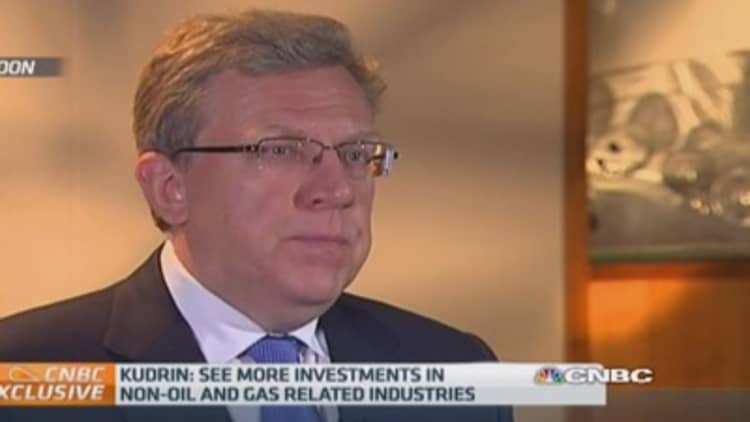Standard & Poor's affirmed its ratings on Russia Friday, providing relief to markets that had feared a downgrade.
In giving its ratings update, the agency cited its expectation that Russia will maintain a "strong net external asset position" and moderate government debt.
"We are affirming our 'BBB-/A-3' long- and short-term foreign currency ratings and our 'BBB/A-2' long- and short-term local currency ratings on Russia," S&P said in a statement.
Read MoreRussia's Putin accuses US of damaging world order
Investors had worried about a downgrade given the geopolitical conditions and the price of oil over the last six months. Back in April, S&P cut Russia's rating to BBB-, one step above junk, with a negative outlook. At the time, it warned that it could cut Russia's rating again, citing a number of conditions:
- If the economy weakens significantly
- If inflation climbs to above 10 percent
- If the country struggles to coordinate fiscal policy and monetary policy in order to support growth
- If tighter economic sanctions were imposed that would significantly weaken the country's net external positions.
Russia was slapped with economic sanctions from both the United States and the European Union in response to President Vladimir Putin's annexation of Crimea and its apparent use of its military to undermine Ukraine.
In April, S&P assumed that Russia's real GDP growth would stand at 1.2 percent for 2014 and 2.2 percent in 2015. But some analysts believe Russia is already in recession and will stay in one in 2015.
S&P may also be focusing on whether corporate obligations that are to come due in the next 12 months can be financed, said Ian Hague, co-founder of Firebird Management, an investment firm that focuses on the former Soviet Union and Eastern Europe.
What's at stake is "whether there is going to be enough money for the Russian government to fund these companies that owe these corporate euro bonds, and what that does to the budget," Hague told CNBC.
Read MoreThe price of oil is not where Russia needs it to be
Earlier this month, the Institute of International Finance said that "Sanctions have pushed Russia into recession" and warned that if the situation between Russia and Ukraine escalates, Russia's GDP could fall more than 6 percent next year under a worst-case scenario that combines low oil prices, more sanctions, and heavy fighting.

In August, Russia's economic ministry halved its official economic growth forecast for 2015 to 1 percent, even before the decline in the price of oil. According to the IIF, the greatest threat to Russia is a sustained drop in oil prices: "Should the latter stay at $90/barrel, compared to a baseline of $100/barrel in 2015, the economy would lose 2 percent of GDP in revenues. The result would be deeper recession a weaker ruble and higher inflation."
Read MoreShould America worry about a China-Russia axis?
The ruble weakened to a record low against both the dollar and the euro on Friday. The ruble stood at 53 euros on Friday; meanwhile, the , on pace for its largest yearly gain versus the Russian currency since 1999.
—CNBC's Everett Rosenfeld and Ted Kemp contributed to this report.


